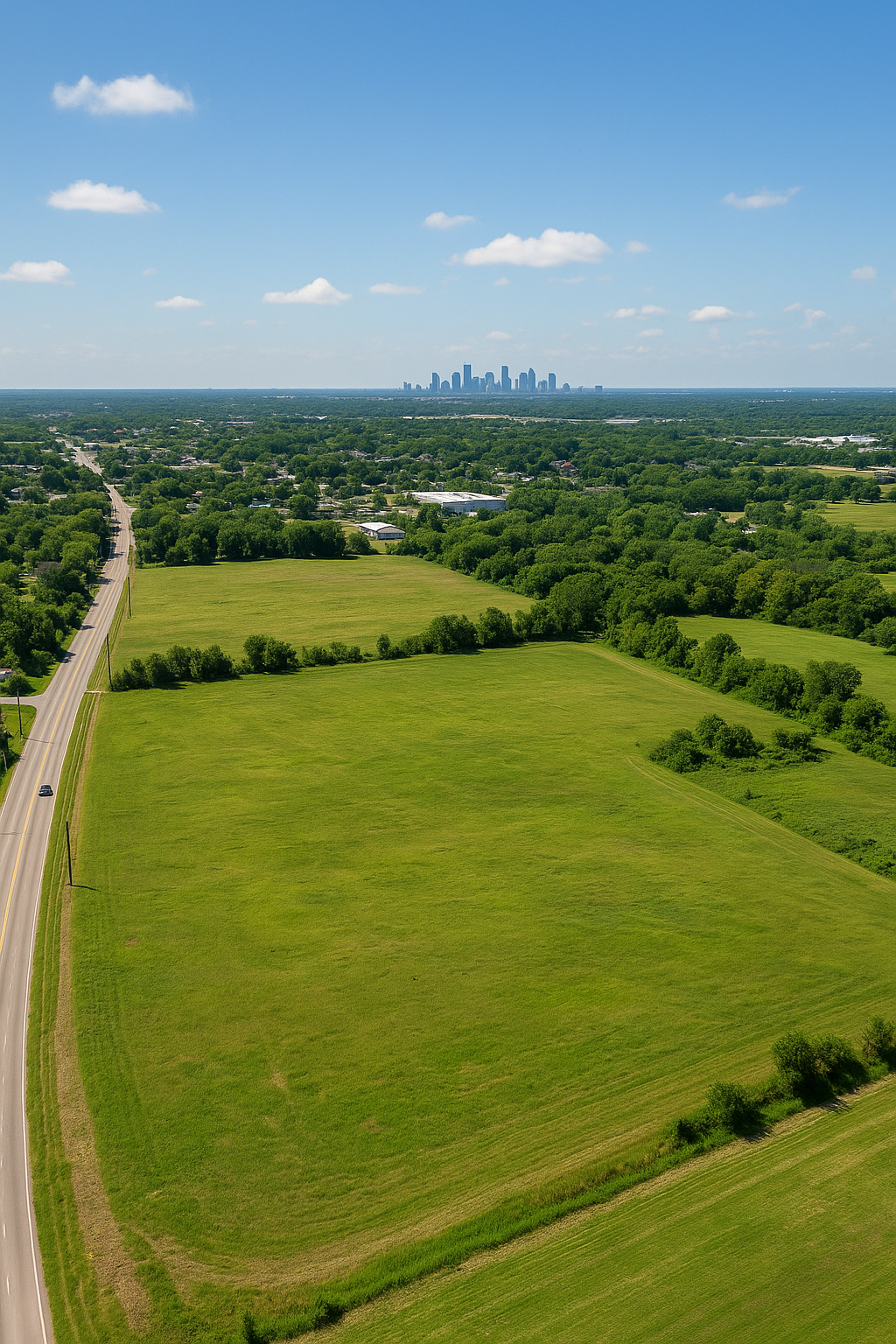If you’ve ever dreamed of owning your own property in Houston, you’re not alone. The city’s booming economy, expanding suburbs, and relatively affordable prices make it one of the most attractive real estate markets in the U.S. But before diving into listings or meeting with agents, it’s essential to understand how to buy land in Houston the right way.
Buying land isn’t as simple as purchasing an existing home, there are unique steps, legal considerations, and financial processes that can make or break your investment. Whether your goal is to build a custom home, start a business, or invest in raw property for the future, we will walk you through everything you need to know.
When exploring opportunities for land development services in Houston, Texas, understanding the local market dynamics, land-use rules, and financing options will help ensure your investment is secure and profitable for years to come.
Why Buy Land in Houston?
Houston’s land market has gained national attention for its diversity and affordability. The city continues to attract families, investors, and developers for several reasons:

1. Strong Economic Growth
Houston’s economy thrives on energy, healthcare, shipping, and technology, industries that consistently fuel demand for housing and commercial expansion. This growth creates a steady need for more residential and business developments, keeping land values resilient even during national market fluctuations.
2. Affordable Entry Points
Compared to major cities like Dallas or Austin, land prices in Houston remain surprisingly accessible. Whether you’re looking for a suburban lot, farmland on the outskirts, or commercial acreage, you can find opportunities to match nearly every budget.
3. No Traditional Zoning Laws
Houston stands out as one of the few U.S. cities without standard zoning regulations. Instead, it relies on deed restrictions and land-use controls, which can actually offer greater flexibility to developers, as long as you understand the rules.
4. Expanding Infrastructure and Job Market
With new roads, transit lines, and growing business districts, Houston’s outer suburbs are rapidly becoming prime investment zones. Buying land in these areas can provide significant appreciation over time.
These factors combine to make Houston one of the most versatile and promising regions for real estate investors, homebuilders, and entrepreneurs.
Define Your Purpose Before Buying Land
Before searching for property, clarify your primary reason for buying. Your purpose will guide every decision that follows, from location and lot size to financing type and future development plans.
Common Reasons for Buying Land in Houston:
- Residential Development:
Many buyers purchase lots to build their dream homes or create small residential communities. When considering residential land, research nearby schools, amenities, and traffic flow to ensure convenience and long-term value. - Investment and Appreciation:
Buying land in Houston as an investment means targeting emerging areas with growth potential. Land near expanding highways or business corridors tends to appreciate faster. - Commercial or Industrial Development:
Entrepreneurs often look for land with easy access to major roads, shipping routes, and utilities. Houston’s flexible land-use structure makes it ideal for commercial and industrial projects. - Agricultural or Recreational Use:
For those interested in farming, ranching, or creating a private retreat, rural lots outside the metro area provide more acreage at lower prices.
By identifying your goal early, you’ll save time and avoid properties that don’t align with your vision.
Research the Houston Land Market
Once your purpose is clear, it’s time to explore the market. The Houston metropolitan area spans a vast region, from bustling neighborhoods near Downtown to peaceful acreage north and west of the city.
Where to Search:
- Online Real Estate Platforms:
Use trusted websites like Zillow, Realtor.com, and LandWatch. Search with keywords to find up-to-date listings. - Local Real Estate Agents:
A land specialist familiar with Houston’s geography can help you uncover hidden gems, including off-market properties that never make it online. - Auctions and County Sales:
Public auctions sometimes offer discounted land parcels, but do your due diligence first, some may come with unpaid taxes or liens. - Drive Through Target Areas:
Many prime plots are still advertised with simple roadside “For Sale” signs. Exploring in person helps you visualize the environment, nearby development, and road access.
Houston’s land market changes quickly, so check for new listings frequently and act fast when you find a property that fits your criteria.
Understand Land Use and Restrictions
Unlike most major U.S. cities, Houston does not enforce formal zoning laws. This gives buyers more flexibility but also more responsibility to understand what they can and cannot build.

Here’s what you need to review before making an offer:
Deed Restrictions
These are rules established by neighborhood associations or previous developers that control how a property can be used. They may limit structure size, architectural style, or even prohibit certain commercial activities.
Flood Zones
Parts of Houston are located in flood-prone areas. Always check the property’s floodplain status using FEMA flood maps. Land within high-risk zones might require flood insurance and can limit development options.
Utilities and Infrastructure
Confirm whether the lot has access to electricity, water, and sewage lines. Some rural properties will require private wells or septic systems, which add to the total development cost.
Access and Easements
Easements grant others the right to use part of your property (for utilities or road access). Understanding these restrictions ensures you don’t face surprises when building.
Because buying land in Houston often means balancing opportunity with responsibility, verifying these factors upfront protects you from costly setbacks later.
Evaluate the Land’s Suitability
Once you’ve identified a few potential lots, evaluate their condition and practicality for your intended use.
1. Topography and Soil Quality
Flat, stable ground is generally best for building. Have a professional soil test done if you plan to construct a home or commercial building, Houston’s clay-heavy soil can impact foundation costs.
2. Environmental Concerns
Check for contamination, protected wetlands, or conservation easements that could limit construction.
3. Accessibility
Proximity to roads, schools, and public transportation adds value for residential buyers. For commercial investors, highway visibility and truck access may be more important.
4. Nearby Development
Look at growth patterns. Land near new subdivisions or retail centers is likely to appreciate quickly, while remote tracts may hold value long-term but grow slower.
Performing this evaluation helps ensure that your land investment aligns with your goals and budget.
Secure Financing for Your Land Purchase
Financing raw or undeveloped land can be more complex than getting a standard home mortgage. Because lenders view vacant land as higher risk, they often require higher down payments and shorter loan terms.
Types of Land Loans:
- Raw Land Loans:
For completely undeveloped land without utilities. They’re harder to obtain and usually require a large down payment (up to 50%). - Unimproved Land Loans:
For land with basic infrastructure, such as access roads or partial utility connections. - Improved Land Loans:
For lots already equipped with utilities, making them ideal for building projects. - Construction-to-Permanent Loans:
Combine land and building financing into one loan, converting to a standard mortgage after construction.
Other Financing Options
- Seller Financing:
Some sellers allow buyers to make payments directly to them, often with more flexible terms. - Specialized Land Lenders:
Certain local banks and credit unions in Houston focus on land loans and can offer competitive rates. - Cash Purchases:
Paying cash can strengthen your negotiation position and simplify the closing process.
Before committing, compare lenders and understand each loan’s requirements for credit score, down payment, and repayment terms.
Conduct Due Diligence
Before signing any contract, perform a thorough due diligence process. This is where you confirm that the land’s title, condition, and value are all in good standing.
Key Steps:
- Title Search:
Ensure the seller has clear ownership and no liens or encumbrances. - Land Survey:
Hire a licensed surveyor to define boundaries, easements, and encroachments. - Environmental Testing:
Identify potential contamination, especially for commercial or industrial properties. - Appraisal:
Request a professional appraisal to verify market value before making an offer.
Taking these steps protects your investment and helps prevent legal disputes after purchase.
Make an Offer on the Land
When you’ve identified the right property and confirmed it meets your needs, it’s time to make an offer. Work with your agent to draft a competitive proposal based on comparable sales in the area.
Include contingencies in your offer such as:
- Title Contingency: Ensures the title is clear before you proceed.
- Survey Contingency: Allows you to back out if property boundaries or easements present issues.
- Inspection Contingency: Gives you time to assess environmental or physical conditions.
Consider adding earnest money, typically 1–10% of the purchase price, to show the seller you’re serious. The stronger your offer, the more likely you’ll close the deal quickly in Houston’s competitive market.
Review and Sign the Contract
Once your offer is accepted, both parties will sign a land purchase agreement. Review this contract carefully, it legally outlines the terms, contingencies, payment structure, and closing timeline.
If you’re using financing, the lender will review your credit and income to issue a loan disclosure, which details your estimated monthly payments and closing costs. Always have a real estate attorney examine the final contract for discrepancies or unclear clauses.
Verify that:
- The purchase price matches what you agreed upon.
- All contingencies are included.
- Title insurance coverage is in place.
- Earnest money is correctly documented.
This step ensures your rights as a buyer are protected from start to finish.
Close on the Land
Closing marks the official transfer of ownership. Be prepared to handle the following:
- Closing Costs: These include title insurance, recording fees, and administrative expenses.
- Final Documentation: You’ll sign the deed and any loan-related documents.
- Title Insurance: Protects against any future claims on the property.
- Recording the Deed: The county clerk’s office will record the new ownership.
Once payment is finalized and all paperwork is filed, congratulations, you officially own your piece of Houston land!
After Closing: Develop or Hold the Property
Now that you’ve completed your purchase, what comes next depends on your goals.
If you’re planning to build a home, consult with experienced builders who specialize in land development services and Houston-area construction. They can guide you through site preparation, permitting, and connection to utilities, and consider software options like buildertrend alternatives to help manage timelines, budgets, and contractor communication.
If you bought land for investment, stay informed on local growth trends. Monitor nearby infrastructure projects, such as new roads or commercial centers, which can raise your property’s value over time.
Land ownership in Houston can be highly rewarding, but maintaining it responsibly, from property taxes to site improvements, will maximize your long-term returns.
Common Mistakes to Avoid When Buying Land in Houston

Even experienced investors can overlook key details. Avoid these common pitfalls:
- Skipping the Flood Check:
Houston’s geography makes flood risks a serious concern. Always confirm FEMA flood zone maps before buying. - Neglecting Utility Access:
Installing water or electricity lines later can add tens of thousands of dollars to your budget. - Ignoring Deed Restrictions:
Restrictions may limit your ability to build a second dwelling, run a business, or modify structures. - Underestimating Long-Term Costs:
Property taxes, maintenance, and liability insurance are ongoing expenses many buyers forget. - Failing to Conduct Due Diligence:
Skipping title or environmental checks can result in major legal and financial issues later.
Being thorough from the start ensures your purchase remains a sound, profitable investment.
Frequently Asked Questions (FAQs) About How to Buy Land in Houston
Prices vary by location, rural land may cost around $2,500–$5,000 per acre, while suburban lots near the city can exceed $100,000 per acre.
Yes, but it’s safer to work with a land specialist who can handle negotiations, surveys, and title checks.
Yes. Many sellers in Houston offer flexible owner financing options with smaller down payments and shorter terms.
Houston doesn’t use traditional zoning laws but relies on deed restrictions and land-use regulations instead.
Focus on areas near new highways, industrial zones, or upcoming residential developments for maximum appreciation.
Most land transactions close within 30–60 days, depending on financing and title processing.
If your land lies in a FEMA-designated flood zone, flood insurance may be required by lenders and is always recommended.
Not always, deed restrictions or HOA rules may limit building types, materials, or commercial use.
Expect to pay between 20% and 50% of the purchase price, depending on the land’s development stage and lender.
Texas has no state income tax, but property taxes can be higher than average, around 2–3% annually of the assessed value.
Final Thoughts: Building Your Future in Houston
Learning how to buy land in Houston is about more than just finding an affordable lot, it’s about making informed choices that align with your goals. From understanding Houston’s unique land-use system to choosing the right financing, every step plays a crucial role in your success.
When you take the time to research, plan, and partner with trusted professionals, your land purchase can become one of the smartest investments you ever make.
Whether you’re building your dream home, starting a business, or simply investing for the future, Houston offers endless opportunities to grow and create lasting value.
If you approach buying land in Houston with clarity, diligence, and professional support, you’ll gain not just property, but the foundation for a truly rewarding future.







